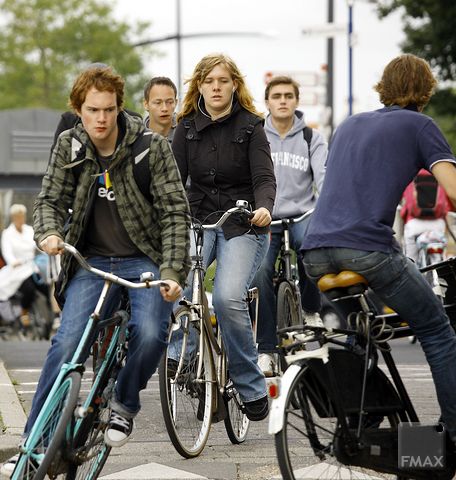Je moet het maar durven, ’s morgens vroeg op de fiets stappen en naar de TU-campus rijden. Het is een heuse survival of the fittest, waarbij iedereen stug zijn eigen weg baant, gewapend met weinig meer dan een gevaarlijke blik in de ogen.
Bij de Hambrug, hier op de foto, gaat het altijd maar weer net goed.
Delta 11-01-2007
‘A bicycle for the unemployed and disabled, so they could sell ice-cream. In Africa, TU Delft inventions can make a difference.’
Two years ago, four industrial design students went to Accra, Ghana, with a mission: to invent something that would make the lives of the disabled and unemployed easier. They came up with an unexpected idea: a hand-driven tricycle that street vendors could use to sell ice-cream. “It’s perhaps surprising to sell ice-cream in a third world country, but the people of Ghana love ice-cream as much as we do. We wanted to develop something that would make it possible for the street vendors to be mobile, make money and become more independent. They are very enthusiastic about this project, because this brings them new opportunities in life. Now they no longer have to beg”, says Esther Blom, of the Delft Centre for Entrepreneurship (Technology, Policy and Management).
But the last two years have also revealed that there is a downside to selling ice-cream. “Ice-cream weighs a lot. There were lots of complaints about that”, says Blom. ‘Ghana Moves’ is therefore now talking with a local bakery about selling bread rolls instead. “The street vendors could for instance use their bikes to deliver bread to hotels”, Blom explains. “In this project, it all comes down to working together with local businesses.”
Blom is collaborating on a spin-off of the ‘Ghana Moves’ project in Ukraine. Under the name of ‘Ukraine Moves’, two business students are currently looking into developing the tricycle for this country in Eastern Europe. “The students showed a Ukrainian boy in a wheelchair pictures of our bike. He was so enthusiastic that he almost fell out of his chair”, Blom says. “We’ve also done research in India. Perhaps we could connect the bicycle there to selling clean drinking water.”
Blom is looking for students who would like to help further develop these spin-offs, and she emphasises that students can learn a lot by participating in such projects: “We teach them to create technical solutions in a different context. They have to make smart choices. The second group of students who worked on the tricycle in Ghana for instance, came up with great improvements; they changed the wheel suspension system so the bicycle was lighter and easier to use. Since last year, we have a minor in international entrepreneurship and development. It’s great to see the ideas students come up with each time. This year we’re working on a fridge for developing countries. Our course was full in two days time, which shows just how popular it is for students to come up with innovative solutions for helping people in the third world.”



Comments are closed.